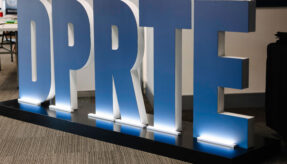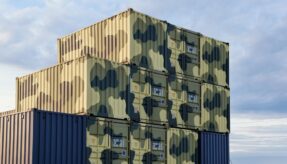
The MOD is determined to harness the advantages of opening up its supplier base by making it easier for SMEs to do business with defence by removing the challenges faced by those companies looking for work with the defence sector.
Speaking at Defence Procurement, Research, Technology & Exportability (DPRTE) 2019, Jim Carter, Commercial Director, Supply Chain at MOD, outlined how the Department was moving ahead with plans to improve its industrial engagement – including its new SME Action Plan.
The MOD’s SME Action Plan, launched at the end of March, outlines how it will improve its procurement spend with SMEs through working with major suppliers to remove barriers and improve access to opportunities for doing business with defence.
Jim says: “The MOD is the largest procurement organisation in central government. We manage some of the most complex and technologically advanced requirements in the world.
“One of our key messages is that we are going to need a deeper collaboration with our supply chain and be ever more demanding.”
The MOD is looking to improve its commercial relationships across all aspects of the supply chain, starting with its prime contractors through its Strategic Partnering Programme.
Jim explains: “Strategic partnering is about a refreshed approach to delivering improved performance with some of our very largest suppliers.
“The objective is about making us more joined up as a customer. It is a complex landscape, so for both MOD and supplier having coherence and consistency in terms of that is key, but then it’s about driving tangible improvements in contractual performance to deliver mutual benefits to both organisations.”
With the Strategic Partnering Programme very much concentrating on individual relationships, the Defence Suppliers Forum (DSF) looks at how the MOD can improve as a collective industry.
Chaired by Defence Secretary Gavin Williamson, the DSF acts as the major conduit for MOD-industry relationships and includes representatives from prime contractors, international companies and SMEs.
The DSF, which has recently undergone a refresh, brings together suppliers throughout the defence supply base with a focus on three themed areas of development: Capability, International & Innovation; People & Skills; and Commercial Enterprise & Acquisition.
Jim comments: “The DSF is a central mechanism for the MOD and industry to work together on strategic change to support a joint vision developed together with industry.”
Jim is keen to point out that overloading the industry with SMEs is not the solution to the challenges defence is facing, but that the MOD is seeking instead to ensure organisations of all sizes – preferred contractors, mid-tiers and SMEs alike – are being engaged to their optimal potential.
“One of the fundamental shifts we have made is that we want this to be a really inclusive structure. We’ve probably fallen into the trap of saying, ‘We have a real challenge with SMEs – what we should do is fill the room with them and then we will solve that problem.’
“We’ve realised that’s not going to crack it and it’s not going to crack it across this whole structure. We are trying to be much more inclusive in terms of our prime suppliers, our mid-tiers, our SMEs and our trade associations and bring them together.”
This new vision for inclusivity was epitomised by an SME forum run by the MOD at the end of January.
The Defence SME Forum, chaired by Minister for Defence Procurement Stuart Andrew, gives SMEs an opportunity to share their views and experiences of working in defence.
Jim says: “It was a much richer conversation – the outputs were much clearer because undoubtedly this is something we are going to have to tackle together.”
The forum, in conjunction with dialogue with trade associations and surveys, will be used to gain a greater understanding of the challenges SMEs face when doing business in the defence supply chain.
The SME Champion programme is another endeavour where the Department hopes to achieve this ambition.
Each of the 19 Strategic Suppliers has appointed an SME Champion to help change behaviours and share good practice to improve engagement with SMEs.
Jim notes: “This is a new approach to tackling this issue and encourages the primes, through these SME Champions, to be the conduit into the SME market and have plans and targets themselves around SME usage.”
The MOD’s SME Action Plan credits the strategy for helping achieve one of the best response rates for the FY 2017/18 indirect spend survey, and actively supporting wider government work on SMEs led by the Cabinet Office.
The programme received a positive response in the recent meeting of the Defence SME Forum.
Jim explains: “We had a really successful DSF SME conference at the end of January with the Secretary of State for Defence and the Minister for Defence Procurement; having that inclusive approach with the SME Champions was really effective and we had great feedback in terms of that event.”
Going forward, the MOD will continue to work with the SME Champions to improve access to opportunities for SMEs.
Another tool being used to make it easier for innovators, SMEs and non-traditional suppliers to do business with defence is Defence Contracts Online (DCO).
DCO is the official source of MOD contracts, providing a one-stop shop for information on contracting opportunities, market engagement events, support to innovation and exports.
The online resource recently underwent a refresh that has increased the functionality of its supplier portal to enable suppliers to advertise supply chain opportunities and reach a wider audience.
Feedback on the new functionality has so far been extremely positive with both Boeing and Rolls–Royce recently signing up to the service.
Speaking at DPRTE’s Supply Chain & Partnering Zone, Caroline Hose from the MOD’s Strategic Supplier Management Team said the DCO brand was well recognised in the industry, with Boeing in particular being “very pleased with their experience”.
DCO’s new sub-contracting advertising facility will be a key element in the MOD achieving its target of 25% of direct and indirect spend going to SMEs by 2022.
Jim explains: “Our supplier portal is a real gateway into our activity through DCO and we’re working with our major suppliers to encourage them to advertise their supply chain opportunities too.
“We are absolutely committed to the target of 25% of spend with SMEs by 2022. That is why DCO is so important in that it highlights those opportunities deeper within the supply chain, because that figure won’t be achieved obviously with our direct procurement.
“Our analysis reveals supply chains of eleven or twelve tiers in some instances, so there are significant opportunities out there.”
To discuss booking your 2020 exhibition or sponsorship package, call 0845 270 7066 or email exhibitions@dprte.co.uk.
If you would like to join our community and read more articles like this then please click here.
DPRTE DPRTE 2019 industrial engagement Jim Carter MOD SME Action Plan







